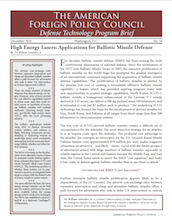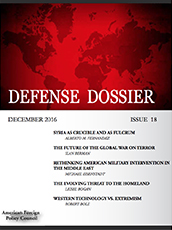Global Islamism Monitor: No. 34
Boko Haram's economic impact;
ISIS in Afghanistan: Down, but not out;
How the Taliban moves money;
Targeting the cyber caliphate;
ISIS seeks softer targets in Europe;
A helping hand from Riyadh
Boko Haram's economic impact;
ISIS in Afghanistan: Down, but not out;
How the Taliban moves money;
Targeting the cyber caliphate;
ISIS seeks softer targets in Europe;
A helping hand from Riyadh
State Councilor meets with Trump advisers;
Concerns grow over shadow debt at Chinese banks
Xi wants universities to be ideological strongholds of CPC;
Taiwan president to make stopover in New York
Beijing to stop all coal mining by 2020;
China eyes $2.2B cash-for-oil deal with Venezuela
In his March 2016 speech at the American Israel Public Affairs Committee policy conference, then-candidate Donald Trump promised that his administration would "move the U.S. embassy to the eternal capital of the Jewish people, Jerusalem." Last week, ambassador to Israel designate David Friedman said he looks forward to working "from the U.S. embassy in Israel's eternal capital, Jerusalem." Senior aide Kellyanne Conway has confirmed that the move is a "very big priority for this president-elect, Donald Trump."
Beijing seeks to combat capital flight;
Myanmar rebels attack trading post on China border

For decades, ballistic missile defense (BMD) has been among the most controversial dimensions of national defense.
Donald Trump’s decision to break protocol and become the first president-elect in decades to speak by phone with a Taiwanese president was either a colossal blunder or a shrewd strategic coup, depending on which Beltway insider you ask. At the least, Trump’s divisive exchange with Taiwanese President Tsai Ing-wen has sparked a substantive debate about the nature of U.S.-China-Taiwan relations and the sanctity of Beijing’s version of the “One-China” policy, which codifies China’s inalienable sovereignty over Taiwan and Tibet.
Last week the USNS Bowditch, an unarmed U.S. Pathfinder-class survey ship manned by a civilian crew, was shadowed by a PLA Navy (PLAN) Dalang-III-class salvage and rescue vessel as it operated 50 nautical miles (nm) northwest of the Philippines’ Subic Bay. As the Bowditch maneuvered to recover an unclassified “ocean glider” Unmanned Underwater Vehicle (UUV) gathering hydrographic data, a smaller ship was launched by the PLAN vessel to capture the UUV. Just 500 meters away, the Bowditch established radio contact but the Chinese vessel left the area with a simple reply: “We are returning to normal operations.”
Russians at risk of poverty;
Moscow extends an olive branch
Trending toward terminators;
Army adopts 3D printing;
Combating suicide drones;
The future of UAV fueling;
How drones are reshaping American strategy
“India has done enough to simplify its defense procurement and other norms,” opined Indian Defense Minister Manohar Parrikar at a speech in Washington last December. “It is time for U.S. Government and Industry to reciprocate. It is easy to blame Indian bureaucracy but in some cases, U.S. bureaucracy is much worse.’’
Firebase: Crimea;
Russian subversion in the Balkans
Pro-China groups rally in Hong Kong;
In ongoing reshuffle Xi populates more ministries with loyalists
President Barack Obama believed that reaching a deal with Iran over its nuclear weapons program would be a historic diplomatic breakthrough that could lead to a fundamental transformation in U.S.-Iranian relations and, more importantly, to significant changes in Iran's international behavior. But, nearly a year after the deal's implementation, there are no signs of change in Iran, and good reason to believe that the deal is in its final days.
China opens Gwadar port in Pakistan;
Chinese firm assumes stake in Iran's South Pars gas field
Single in Tehran;
The regime turns on its own;
An Israeli strike, back on the table;
Iran's newest weapon;
Iran's naval ambitions, revisited
Russia's military spending takes a hit... finally;
Who is a Russian, really?

Syria As Crucible And As Fulcrum
The Future Of The Global War On Terror
Rethinking American Military Intervention In The Middle East
The Evolving Threat To The Homeland
Western Technology Vs. Extremism
Bridging the capabilities cap;
Laser countermeasures begin to emerge;
Drone tracking, a new Pentagon priority;
Russia's new invisibility cloak;
Falling behind in the space arms race;
DARPA develops unhackable code
Senior Chinese security official named head of Interpol;
New anti-corruption body formed
CRM Special Issue: Xi's Newest Political Shakeup
The price of Russia's Syria policy;
Germany's vulnerable military;
A costly counterterrorism campaign;
Nigeria's foreign Islamists
Fear and loathing in Prague;
Russia's plan to further destabilize Ukraine
My previous article for The Diplomat examined Filipino President Rodrigo Duterte's trip to Beijing and the security and economic implications of the deals he sealed with China to construct ports and artificial islands in the Philippines.
In Foreign Affairs this May, I wrote about the implications of China's investments in the Sri Lankan ports of Colombo and Hambantota, which had not only plunged Sri Lanka into debt, but raised questions about the security and defense consequences of Beijing's use of economic statecraft, including in rekindling Sino-Indian rivalry.
The emergence of new details about China's endeavors in Sri Lanka merit revisiting what is quickly becoming a case study for China's emerging One Belt One Road (OBOR) initiative.
Hong Kong erupts in protests again;
China says national carbon trading scheme coming in 2017
Will America strike back in cyberspace?;
A push for more flexible military service
Like every news event that shared last week with the U.S. presidential elections, Indian prime minister Narendra Modi's visit to Japan was swallowed up by American electoral headlines. What attention his summit with Japanese prime minister Shinzo Abe did attract centered on the consummation of a long-pending nuclear cooperation deal. For a host of reasons covered extensively elsewhere, the deal is symbolically and practically significant for both countries.
The United States’ relationship with Iran tops the list of foreign policy issues that will confront President-elect Donald Trump when he takes office in January. Like many of the other Republican presidential candidates, Trump was an early and staunch opponent of the Joint Comprehensive Plan of Action (JCPOA), the controversial nuclear deal concluded last summer between six world powers and Iran. But Trump took up contradictory positions on the deal over the course of his campaign, at times promising to tear it up and at others suggesting he would simply amend it.
The United States faces critical challenges in the Middle East. Whether instability in Syria fomenting a refugee crisis, the spread of the Islamic State group and its extremist ideology, or the rising power of Iran, conditions in the region are more threatening than they were when President Barack Obama took office. The new Trump administration will have its work cut out for it.
China eyes closer ties to Iran post-sanctions;
Xi visits Bangladesh, pledges $24 billion
Military veterans get shortchanged;
Russia settles in in Syria
CDI serving as Party's political inquisitor;
Xi stresses value of party control over state-owned enterprises
Russian rubles spur Ukrainian separatism;
Militarizing Kaliningrad
China eyes closer ties to Iran post-sanctions;
Xi visits Bangladesh, pledges $24 billion
You might not know it, but Russia is losing. The official narrative, promulgated by the Kremlin via its extensive propaganda machine, is that Russia is resurgent on the world stage, and that its status as a global power is increasingly unassailable. Over time, this take has become embraced in official Washington, to the point where it is now more or less conventional wisdom, at least on the presidential campaign trail.
When Roridgo Duterte, the impish and combustible president of the Philippines, paid a state visit to China last month the press contextualized the trip as part of his jarring U-turn away from the U.S. alliance and toward China’s lucrative embrace. That narrative, and Duterte’s apparent determination to restructure the regional order, have received no shortage of coverage and analysis in The Diplomat and beyond.
Moscow nixes plutonium pact;
An S-300 to guard Assad
Scattered among the hundreds of kiosks that made up the massive China-Eurasia Expo held in the western Chinese city of Urumqi in late September were a handful of Iranian rug merchants plying their wares. They didn't seem to sell much, but they weren't worried. The merchants, like the Iranian government itself, were looking ahead - and there are plenty of opportunities these days, particularly in China.
The Islamic State's resilient financial infrastructure;
Fear and loathing in Astana;
A new ISIS tactic: Exploding drones
Today, the power of the United States to communicate with global audiences is being directly challenged by the Islamic State group. Over the past year, political and policy leaders have been amazed at how what was once described by President Barack Obama as a "JV" league terrorist organization could produce a polished magazine and high quality recruiting videos, modify online games and generate a handful of mobile apps, including one targeting children. Moreover, much of this media activity continues to take place, despite recent battlefield setbacks suffered by the group in both Iraq and Syria.
China invests in Tajik security;
Azerbaijan's oil riches go sour;
Uzbekistan's new diplomacy;
The CSTP eyes Syria;
Religion on the rise in Kazakhstan
The FSB tackles metadata;
Crimea's Tatars seek legal recourse
Japan contemplates how to counter China at sea: Hypersonics: A widening capabilities gap;
DARPA targets anti-drone tech;
China's cruise control;
Meeting the challenge of artificial intelligence
PLA veterans stage protest for better benefits;
More tigers and flies fall amid anti-corruption campaign
Russia
and China to collaborate against US missile defenses;
Chinese firms skirting DPRK sanctions
Spotlight on China-Pakistan Economic Corridor (CPEC);
Hong Kong economy reeling
China encourages citizens to have more children;
Chinese firms accused of violating DPRK sanctions
We now face the ironic, yet all-too-predictable, result of years of U.S. appeasement of Iran in order to secure a global nuclear deal: U.S. military involvement in a proxy war with the Islamic Republic in Yemen.
Now Russian hacking hits Germany;
Full speed ahead for "
Yarovaya"
monitoring